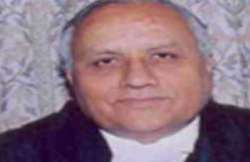Disputed Structure Built Against The Tenets Of Islam: Judge
Lucknow, Sep 30: Holding that the entire disputed site in Ayodhya is the birth place of Lord Ram, Justice Dharam Veer Sharma of the Allahabad High Court on Friday said that the "place of birth

Lucknow, Sep 30: Holding that the entire disputed site in Ayodhya is the birth place of Lord Ram, Justice Dharam Veer Sharma of the Allahabad High Court on Friday said that the "place of birth is a juristic person and is a deity."
"The spirit of divine ever remains present everywhere at all times for anyone to invoke in any shape or form in accordance with his own aspirations and it can be shapeless and formless," Justice Sharma said in his judgement on the Ayodhya title suits. He said the structure constructed by Babar was against the tenets of Islam and cannot have the character of a mosque.
"The disputed building was constructed by Babar, the year is not certain but it was built against the tenets of Islam. Thus, it cannot have the character of a mosque," the judge said.
He said the disputed structure was constructed on the site of the old structure after its demolition. The Archaeological Survey of India has proved that it was a massive Hindu religious structure, he said. The judge said the disputed site "is the birth place of Lord Ram" and that a "place of birth is a juristic person and is a deity."
He said the idols of Lord Ram were placed in the middle dome of the disputed structure in the intervening night of December 22-23, 1949. The judge held that the Sunni Central Board of Waqfs, UP and another main petitioner Nirmohi Akhara were barred by time for claims for title.
He said it established that the property in suit is the site of "Janmabhoomi of Ram Chandraji and Hindus in general had the right to worship Charan, Sita Rasoi, other idols and other objects of worship that existed on the property in suit."
It has also been established that Hindus have been worshipping the place in dispute as Janmasthan and visiting it as a sacred placed of pilgrimage "as a right since time immemorial". After the construction of the disputed structure it has been proved that the deities were installed inside the disputed structure on 22-23.12.1949.
"It is also proved that the outer courtyard was in exclusive possession of Hindus and they were worshipping throughout and in the inner courtyard also they were worshipping," he said. Justice Sharma said, "it is also established that the disputed structure cannot be treated as a mosque as it came into existence against the tenets of Islam." PTI
"The spirit of divine ever remains present everywhere at all times for anyone to invoke in any shape or form in accordance with his own aspirations and it can be shapeless and formless," Justice Sharma said in his judgement on the Ayodhya title suits. He said the structure constructed by Babar was against the tenets of Islam and cannot have the character of a mosque.
"The disputed building was constructed by Babar, the year is not certain but it was built against the tenets of Islam. Thus, it cannot have the character of a mosque," the judge said.
He said the disputed structure was constructed on the site of the old structure after its demolition. The Archaeological Survey of India has proved that it was a massive Hindu religious structure, he said. The judge said the disputed site "is the birth place of Lord Ram" and that a "place of birth is a juristic person and is a deity."
He said the idols of Lord Ram were placed in the middle dome of the disputed structure in the intervening night of December 22-23, 1949. The judge held that the Sunni Central Board of Waqfs, UP and another main petitioner Nirmohi Akhara were barred by time for claims for title.
He said it established that the property in suit is the site of "Janmabhoomi of Ram Chandraji and Hindus in general had the right to worship Charan, Sita Rasoi, other idols and other objects of worship that existed on the property in suit."
It has also been established that Hindus have been worshipping the place in dispute as Janmasthan and visiting it as a sacred placed of pilgrimage "as a right since time immemorial". After the construction of the disputed structure it has been proved that the deities were installed inside the disputed structure on 22-23.12.1949.
"It is also proved that the outer courtyard was in exclusive possession of Hindus and they were worshipping throughout and in the inner courtyard also they were worshipping," he said. Justice Sharma said, "it is also established that the disputed structure cannot be treated as a mosque as it came into existence against the tenets of Islam." PTI